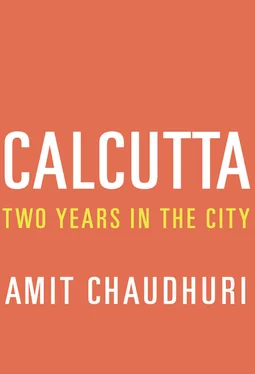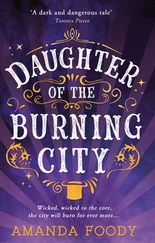And Calcutta had become, as the Americans might say, a dump. By the early eighties, Mother Teresa’s profile as the face of eternity was so widespread that, in the Western world, this great city ( mahanagar ) of modernity, with its many contradictions and exacerbations, was seen as a present-day Galilee, a place of supernatural cures, of lepers awaiting the miraculous touch.
Within India itself, Calcutta had become a butt of jokes. This slow turn was fascinating; the former centre of “culture,” once admired for its eccentricity and waywardness, being ridiculed by other uppity cities like Delhi and Bombay for being obsolete and out of joint; for its unionised workplace, its permanent go-slow work ethic, its oppositional politics. Resistance to change and, eventually, to globalisation came to be seen as Bengali traits. It was a mood encouraged by the Left Front government, which came into power in 1977 and was never thrown out in a subsequent election: an economic climate within which “sick” companies owned by the state were kept on life support, and private sector industry and fresh investment frowned upon. No amount of protestations to the contrary, and moves to lure investments, by the chief minister Jyoti Basu and his successor Buddhadeb Bhattacharya could alter what was now an immovable impression in people’s minds — because the Left Front government was entangled in a fiction of its own making.
From the colonial encounter onward, after which he had emerged in Calcutta as an altogether new breed, soon adept at the ways of the English intruder and then overreaching himself, the Bengali was seen as strange, pretentious, and untrustworthy by both the Englishman and the North Indian. Kipling had a savage distaste for him. My uncle, who was a bachelor and lived in London for decades, had, for his neighbour, a Pakistani, Aftab, who was also his closest friend. Once, Aftab, temporarily choosing to disregard my uncle’s Bengali identity, cautioned him: “Agar dekha saap aa raha hai aur Bangali bhi aa raha hai, pehle Bangali ko maro” —“If you see a snake coming towards you, and a Bengali approaching, kill the Bengali first.” My uncle took this as English crowds at Hyde Park received the invective poured on them by the speaker on the box: with delighted laughter. For, even in the seventies (from when I recount this snatch of conversation), the Bengali identity was unassailable; it didn’t see itself as beleaguered. Besides, my uncle would have agreed that there was some truth to Aftab’s aphorism. After all, the main casualties of Bengali pomposity and mean-mindedness had been Bengalis themselves. This generalisation could cover everyone from the man on the street to the highest beacon in the culture: Tagore’s hostile treatment at the hands of Bengali critics is part of local cultural legend.
Let’s take a brief look at the word “Bengali” in relation to a prefix and an adjective. Almost every Bengali word has an opposite that can be arrived at simply, by adding a prefix, most often the letter “a” (pronounced “aw”): for instance, manush (human) and amanush (inhuman). I’m reminded that there’s probably an infinite list of these, having just revised a chapter on prefixes with my daughter for the Bengali grammar paper in her first annual exams: abichar, asadharan et cetera, all of which she’d had to commit to memory.
Many of these opposites and negatives are traditional, and common to other Sanskrit-derived languages; but some also subtly reflect history. One such word, I think, must be abangali , which would have sprung into being around the time bangali did — its English-language equivalent, used almost as frequently as the Bengali word, and as casually, is “non-Bengali.” It’s telling that, generally, Bengalis aren’t aware of the peculiarity of this term, or of the innocence with which they use it. It has none of the pointedness, the political crassness (and the datedness), of “un-American”; it is regally unselfconscious. As the poet and translator P. Lal (whose origins were in North India, but who was domiciled in Calcutta and married to a Bengali) once wryly said to me over a dinner table during a reception at the governor’s mansion, just when the occasion had ensured we’d run out of things to say to each other, “It’s a unique category, the ‘non-Bengali.’ ” He hinted to me that he could think of no comparable way of viewing the world in another culture. Theoretically, it’s a definition that encompasses the rest of the world; but it’s usually used to refer, in an off-hand way, to the rest of India. What does it signify? A deficiency? An absence? Distance? Or a mode of being, imprecisely acknowledged? Or is it meant to complete and confirm “Bengaliness”?
The adjective I had in mind is “honorary.” There was a time, until two or three decades ago, when Bengalis were still regarded with affection and even admiration in the Anglophone Indian elite; and certain “non-Bengalis” would describe themselves as — or be conferred with the title of—“honorary” Bengalis. This meant that the person in question had a smattering of this refined language of Indian modernity — an Indian language that was actually used as a first language by a home-grown cosmopolitan elite — enough to say, with or without humour, “Ami tomake bhalobasi” (“I love you”) or “Apni kothai thhaken?” (“Where do you live?”). These stray statements performed an incantatory “open sesame”—into the bounded, charmed, small-scale world of “Bengaliness.” The “honorary” Bengali might be myopic; might be an aficionado of art-house cinema; might be politically left wing; might have a taste for lyric poetry; a tendency towards the autobiographical; an appetite for fish; or display none of these traits.
A few days ago, an elderly gentleman, at whose house my wife and I are invited periodically to lavish teas, phoned me about a column he writes for a local newspaper. He expresses his kind esteem of my work by checking out his sentences with me. “Tell me,” he said, “does this sound okay? ‘The cultural scene in the city has been disfigured by the huge presence of non-Bengalis.’ ” “What do you have in mind?” I asked, wondering if he thought the opinion too strong to commit to print. “Does the sentence sound portentous?” he said with concern. “And what about ‘cultural scene’?” “You could change it to ‘cultural landscape,’ ” I said. He made the amendment at once. “Do you think you might offend those non-Bengalis you mentioned?” “I want to offend them,” he replied. “I have only a few years left to live, and there’s nothing I’d like better.”
* * *
The “non-Bengali,” here, is a euphemism for the Marwari; who is referred to slightingly in colloquial Bengali parlance as Mero . The Marwaris are from a province in Rajasthan called Marwar, migrants who moved to this city a century ago, and then, in the last twenty years, being naturally migratory, from the north of Calcutta to the smart bhadralok enclaves of the south. They’re often traders made good; they’re also from a community that has produced some of India’s great industrialist families. The Marwari is a mercantile type; much of the energy and activity in this wavering metropolis emanates from him. Although he now largely controls the economy of the city, he’s long been the object of satire in Bengali literature — often memorable satire. Rajshekhar Basu, who wrote under the pen name Parasuram, and was one of the great Bengali humorists and writers of the mid-twentieth century, has a Marwari businessman in conversation with two corrupt, pusillanimous Bengalis in an early story, “Sri Sri Siddheswari Limited.” The Marwari observes to his Bengali interlocutors, “As your Rabi Thakur said so well, ‘Vairagya sadhan mukti — so hamar naahi.’ ” Parasuram is parodying many things here. Firstly, the Marwari’s Bengali — unrecognisable as Bengali and yet instantly recognisable as Marwari Bengali — a mixture of Bengali, Hindi, and even Maithili, the expansive North Indian vowels not only destroying the rounded modulations of the Bengali language (the product of post-Enlightenment politeness), but killing a famous line from its most famous poet. The Marwari is (mis)quoting a Tagore poem: “ Bairagya sadhane mukti, sei path amaar noi ”—“Salvation through renunciation — that path’s not for me.” Tagore is making an important anti-romantic, anti-metaphysical statement: I don’t wish to turn away from life. The physical, the earthly, are important. Desire, and the urge for life, are important . Parasuram’s Marwari is, in his droll way, making an equally important point: that desire — albeit of a different kind; desire for material reward and well-being — is his chosen path and avowal. The businessman’s interest in Tagore, in Bengali culture, is insincere and even self-servingly creative; and the satire is particularly rich because Parasuram knows the laughter is two-sided — that he’s poking fun at the Marwari, and the Marwari is laughing at the Bengali; laughing, as the saying goes, all the way to the bank.
Читать дальше












